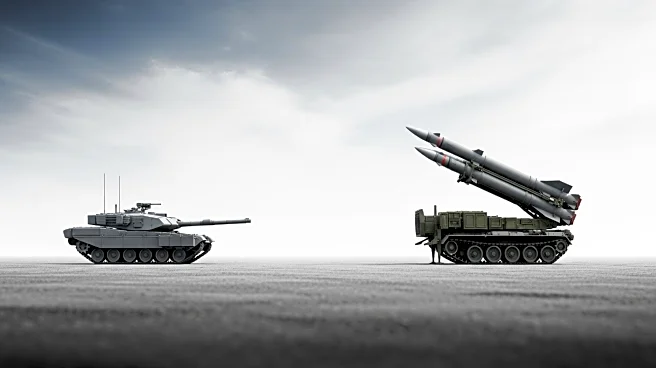What's Happening?
Germany has issued a warning that Russia may be preparing for a direct military confrontation with NATO by the end of the decade. This concern is shared by NATO's eastern flank members, who have raised alarms over hybrid actions attributed to Moscow, such as drone and aircraft incursions. Germany's foreign intelligence chief, Martin Jaeger, stated that Russia would not shy away from direct military confrontation if necessary. The warning comes amid reports that the Kremlin is preparing for a large-scale conventional war with NATO, with Germany identified as a primary target due to its support for Ukraine. The Washington, D.C.-based think tank suggests that any ceasefire in Ukraine could allow Russian forces to redeploy to the eastern border with NATO.
Why It's Important?
The potential for direct military confrontation between Russia and NATO has significant implications for European security and global stability. If Russia were to engage in such a conflict, it could lead to widespread military engagements across Europe, affecting NATO member states and their allies. The warning from Germany underscores the urgency for NATO to bolster its defenses and prepare for possible aggression. This situation could lead to increased defense spending and strategic realignments within NATO, impacting political and military dynamics in the region. The threat also highlights the importance of maintaining unity among NATO members to deter Russian aggression and protect European sovereignty.
What's Next?
In response to the threat, NATO members are likely to increase their defense spending and enhance military readiness. European countries are advancing a 'drone wall' project to protect against Russian incursions, although challenges remain in its implementation. The situation may prompt further diplomatic efforts to de-escalate tensions and prevent military conflict. Additionally, NATO may consider strengthening its presence in vulnerable regions, such as the Baltic states, to deter potential Russian aggression. The international community will closely monitor developments and assess the effectiveness of measures taken to address the threat.
Beyond the Headlines
The warning from Germany highlights the broader geopolitical tensions between Russia and NATO, reflecting ongoing struggles for influence and power in Europe. The use of hybrid warfare tactics by Russia, including election manipulation and propaganda, poses ethical and legal challenges for NATO members. These actions aim to destabilize European countries and undermine democratic processes, raising concerns about the integrity of political systems. The situation also underscores the need for robust cybersecurity measures to protect against disinformation campaigns and safeguard national security.










